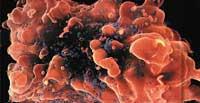HIV attack according to immune system
The aids-causing virus, HIV, affects more those who have common immune system genes than those who have abnormal genes. This has been expressed by researchers at Northwestern University of Chicago (USA).

Researchers have studied the three genes that encode special proteins in the immune system. The function of these proteins is to collect AIDS viruses and extract the surface of the cell. Subsequently, T cells of the immune system meet the cell that contains the virus in the skin and destroy the entire cell, along with a group of viruses and proteins.
In the human population there are variants of these three genes that seem to have a greater impact on people with greater variety and widespread combination. Therefore, the more different a population is, the more difficult it is to expand to HIV and vice versa.
According to researchers, HIV influences the evolution of the human immune system, while the human immune system also influences the evolution of HIV. In addition, the results of the study should be taken into account when making the vaccine.





